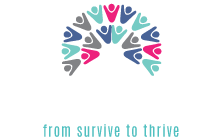“If we have no peace, it is because we have forgotten that we belong to each other.”- Mother Teresa
The CDC study on suicide is staggering. Suicide rates have increased in nearly every state in this country over the past two decades, and half the states have seen an increase of more than 30%. This is a public health crisis, and when I think about my child- who has just entered the challenging years of adolescence- I am frightened.
Those of you who know me well and who have known me for many years know that I have a history of depression and anxiety. Thankfully, I have never been suicidal. I have never thought about taking my own life. But I have been in dark places- places dark enough for me to have a vague sense of the profound pain a person has to be in to have suicidal thoughts and to make that tragic choice to end life.
The worst time was a long time ago. More than two decades ago in fact. But I will never forget what it felt like. I was scared I wouldn’t ever feel better. Now that I have distance, I can see that I made the experience so much worse because, on top of the depression and anxiety, I stacked the deck against myself with guilt and shame. I made myself wrong for my despair. Who was I to be depressed? What the hell was I anxious about? A white, privileged, smart woman from a loving and supportive family… what the fuck was wrong with my life anyway? I had no right.
It wasn’t until I let go of the guilt and shame that I actually began to heal. And I was so incredibly lucky. I had tremendous support from family and friends (I found out later that my mother looked into my best friend’s eyes and asked her to take care of me at school- thank you forever Mom and Molly), and I got help from loving and skilled mental health professionals. I managed to thrive academically and socially in college throughout all of it- even when panic attacks and agoraphobia turned my world upside down (literally- the world tilted when I would walk outside at times- it was terrifying).
I now look back on the worst period with gratitude. I honestly believe that my experience with that kind of pain enabled me to grow into the empathetic person I know myself to be today. And maybe there is a way in which my brush with that kind of suffering planted the seed for me to one day respond to the calling that has always been present and become a coach to support others to transform their lives.
Over the years I’ve done what I’ve needed to do to take care of myself. I’ve taken medication when necessary. I’ve gotten therapy. I love my last therapist- so much so that I thought about asking him to move in with me. My creepy meter stopped me from making that request. I’ve known this truth for many years now: I am not anxiety and depression. I am a person who has been anxious and depressed at times.
Therapy is tremendously supportive for people who need to heal and who can benefit from tending to emotional well-being. It’s a useful support structure to gain awareness about why we are the way we are and to make peace with the past. And therapy is not coaching.
There are some similarities to be sure. They are both structures to support people to learn and grow. They are both relationships that hinge on trust and intimacy. And there are some key differences. As a coach, I:
– relate to my clients as whole;
– give my clients space for their feelings but do not necessarily honor my clients as their feelings;
– do not view myself as an expert- the client is the expert on his or her life;
– neither diagnose nor provide treatment;
– support my clients to break up patterns that don’t serve them, so as to create new results and more fulfilling life experiences- this involves taking a bold stand for them;
– partner with my clients to create their future and spend little or no time at all in the past.
When I begin working with people, I explain what coaching is and what it is not, and I differentiate coaching from therapy. This differentiation isn’t just an academic or clarifying exercise- this is an ethical obligation. But my responsibility in this area does not end there.
I have been trained to listen to, hear and see people at a high level. Good coaching depends on these abilities, which is why I will have a coach of my own for at least as long as I remain in this profession. We all have blind spots, and my coach supports me to distinguish mine so that they don’t get in the way of my ability to coach others.
My training and on-going work with my coach are imperative for so many reasons, not the least of which is that I have to be able to see and hear when someone I am coaching might benefit from a therapy referral- in addition to or in place of- coaching. And I have to be willing to say it- even if it means I have to fire myself as a coach. I am not a therapist, and I will make sure my clients are supported- even if it means that the support comes from somewhere else and from someone else.
We have to take care of each other. We have to do better.
- Questions? Contact Me!
- Phone (215) 704-4054
- [email protected]
- Worldwide
We Belong to Each Other | Support: Coaching v. Therapy
- Home
- Personal & Life Coach
- We Belong to Each Other | Support: Coaching v. Therapy

June 13, 2018


1 Comment
Great post! Thank you for being vulnerable enough to share your story.
Comments are closed.